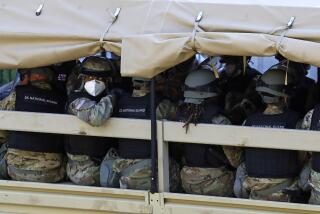The National Guard Is Able, but It’s No Terrorism Expert
- Share via
Americans should not have to be reminded of how vulnerable they are to sudden acts of terrorism, not after the bombings of the federal building in Oklahoma City and the World Trade Center in New York. As Defense Secretary William Cohen reported last week, more than two dozen countries, many of them unfriendly, have or soon will be able to produce easily transportable chemical and biological weapons. But it doesn’t take the resources of a state to make terror weapons that can kill large numbers of people quickly. In 1995 a small cult of Japanese crazies showed in a Tokyo subway what a minute quantity of the nerve gas sarin can do. They had produced the gas themselves, using the simplest equipment.
The National Defense Panel, created by Congress to provide an alternative assessment to the Pentagon’s own analysis of future military needs, calls in its new report for a larger military role in defending against terrorism within the United States. This proposed shifting of some resources from traditional war fighting capabilities to functions usually under civilian control is certain to be controversial. So is the panel’s proposal that the National Guard have a major role in meeting the threat of domestic attacks involving unconventional weapons.
The Pentagon also favors assigning the 400,000-member Guard that task, not least because it doesn’t quite know what to do with the Guard outside of wartime mobilization. Ideally, it would like to see the Guard reduced as a cost-saving measure. But the Guard, though 95% funded by Washington, is under state control until it is federalized, and it carries too much clout in Congress to suffer the fate the military favors. Thus the welcome given by the Pentagon to the notion of assigning the Guard new responsibilities against terrorist attacks.
The trouble is that this assumes a level of expertise and an ability to react swiftly that the Guard simply does not and cannot be expected to have. Rescuing and treating victims of, say, a chemical weapon set off in a high-rise building or a subway calls for an immediate and expert response. In other emergencies where the Guard is needed--floods or civil disorders, for example--mobilization and movement can take many hours. That simply won’t do when terror weapons are involved. Even if some units of the Guard were trained in the highly specialized skills needed to respond to chemical or biological attacks, getting them to the scene of a disaster in time to control the loss of life would be extremely difficult.
The National Defense Panel is right in urging greater preparedness to meet an inexorably growing threat of domestic terrorism. But no preparations will work unless Congress, the White House and the military agree on what resources--people as well as money and equipment--should be allocated to the job. That job of necessity is full-time. The Guard may be able to provide some support functions. But it should not be the lead agency.
More to Read
Sign up for Essential California
The most important California stories and recommendations in your inbox every morning.
You may occasionally receive promotional content from the Los Angeles Times.













